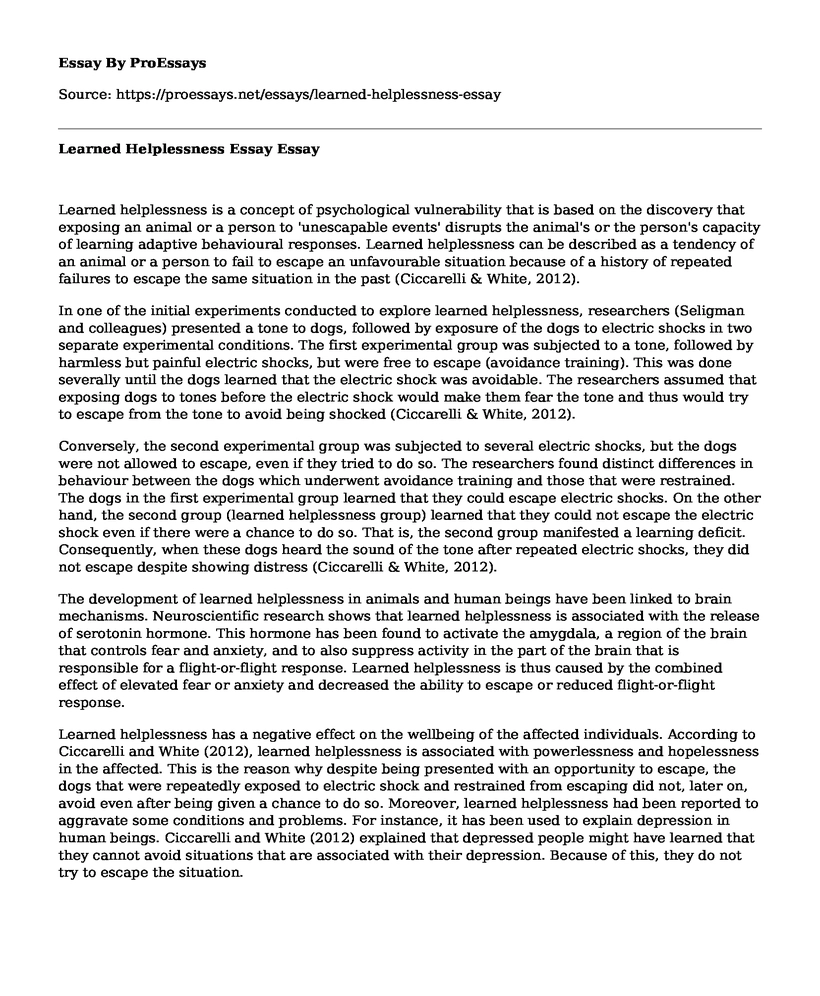Learned helplessness is a concept of psychological vulnerability that is based on the discovery that exposing an animal or a person to 'unescapable events' disrupts the animal's or the person's capacity of learning adaptive behavioural responses. Learned helplessness can be described as a tendency of an animal or a person to fail to escape an unfavourable situation because of a history of repeated failures to escape the same situation in the past (Ciccarelli & White, 2012).
In one of the initial experiments conducted to explore learned helplessness, researchers (Seligman and colleagues) presented a tone to dogs, followed by exposure of the dogs to electric shocks in two separate experimental conditions. The first experimental group was subjected to a tone, followed by harmless but painful electric shocks, but were free to escape (avoidance training). This was done severally until the dogs learned that the electric shock was avoidable. The researchers assumed that exposing dogs to tones before the electric shock would make them fear the tone and thus would try to escape from the tone to avoid being shocked (Ciccarelli & White, 2012).
Conversely, the second experimental group was subjected to several electric shocks, but the dogs were not allowed to escape, even if they tried to do so. The researchers found distinct differences in behaviour between the dogs which underwent avoidance training and those that were restrained. The dogs in the first experimental group learned that they could escape electric shocks. On the other hand, the second group (learned helplessness group) learned that they could not escape the electric shock even if there were a chance to do so. That is, the second group manifested a learning deficit. Consequently, when these dogs heard the sound of the tone after repeated electric shocks, they did not escape despite showing distress (Ciccarelli & White, 2012).
The development of learned helplessness in animals and human beings have been linked to brain mechanisms. Neuroscientific research shows that learned helplessness is associated with the release of serotonin hormone. This hormone has been found to activate the amygdala, a region of the brain that controls fear and anxiety, and to also suppress activity in the part of the brain that is responsible for a flight-or-flight response. Learned helplessness is thus caused by the combined effect of elevated fear or anxiety and decreased the ability to escape or reduced flight-or-flight response.
Learned helplessness has a negative effect on the wellbeing of the affected individuals. According to Ciccarelli and White (2012), learned helplessness is associated with powerlessness and hopelessness in the affected. This is the reason why despite being presented with an opportunity to escape, the dogs that were repeatedly exposed to electric shock and restrained from escaping did not, later on, avoid even after being given a chance to do so. Moreover, learned helplessness had been reported to aggravate some conditions and problems. For instance, it has been used to explain depression in human beings. Ciccarelli and White (2012) explained that depressed people might have learned that they cannot avoid situations that are associated with their depression. Because of this, they do not try to escape the situation.
Conclusion
In conclusion, learned helplessness occurs when an individual or an animal is not able to escape a harsh condition or situation because of the belief that the situation is inescapable. It is caused by repeated failures to escape similar situations or conditions in the past. Neuroscientifically, linked to serotonin hormone and its impacts on fear and anxiety and flight-or-flight response. One of the major effects of learned helplessness is powerlessness and hopelessness of the affected individual.
References
Ciccarelli, S., & White, J. (2012). Psychology (3rd ed.). Boston, Mass: Prentice Hall.
Cite this page
Learned Helplessness Essay. (2022, Jun 17). Retrieved from https://proessays.net/essays/learned-helplessness-essay
If you are the original author of this essay and no longer wish to have it published on the ProEssays website, please click below to request its removal:
- Crime and Mental Illness Essay
- Bipolar Disorder and Dementia: Case Study
- How Aging, Ethnicity, Life Circumstances and Disease Have Affected an Aging Adult? - Essay Sample
- Smoking Habits in Mentally Ill and Veteran Populations - Essay Sample
- Essay on Understanding Life's Purpose: The Journey for Meaning and Knowledge
- Essay Example on Mill's Argument on Happiness at the Root of Morality
- Free Paper Sample on Nurturing Success: The Role of Mentors in Guiding and Inspiring Growth







